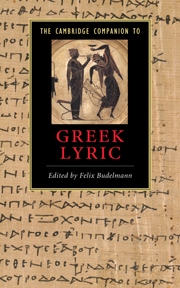Introducing Greek lyric
Published online by Cambridge University Press: 28 May 2010
Summary
In my eyes he matches the gods, that man who sits there facing you - any man whatever - listening from closeby to the sweetness of your voice as you talk, the
sweetness of your laughter: yes, that - I swear it - sets the heart to shaking inside my breast, since once I look at you for a moment, I can't speak any longer,
but my tongue breaks down, and then all at once a subtle fire races inside my skin, my eyes can't see a thing and a whirring whistle thrums at my hearing,
cold sweat covers me and a trembling takes ahold of me all over: I'm greener than the grass is and appear to myself to be little short of dying.
But all must be endured, since even a poor”[
This is Sappho's fragment 31 V, in the translation by Jim Powell. It has proved to be an engrossing text to many readers, arresting in its physicality yet elusive in its description of what is happening between the speaker, the addressee and the man. A long list of later poets were prompted to write their own versions - Catullus, Philip Sidney, Tennyson, William Carlos Williams, Robert Lowell, Marguerite Yourcenar - to name just a few. Sappho 31 is a text that shows the ability of Greek lyric to fascinate readers throughout the centuries.
- Type
- Chapter
- Information
- The Cambridge Companion to Greek Lyric , pp. 1 - 18Publisher: Cambridge University PressPrint publication year: 2009
- 18
- Cited by

